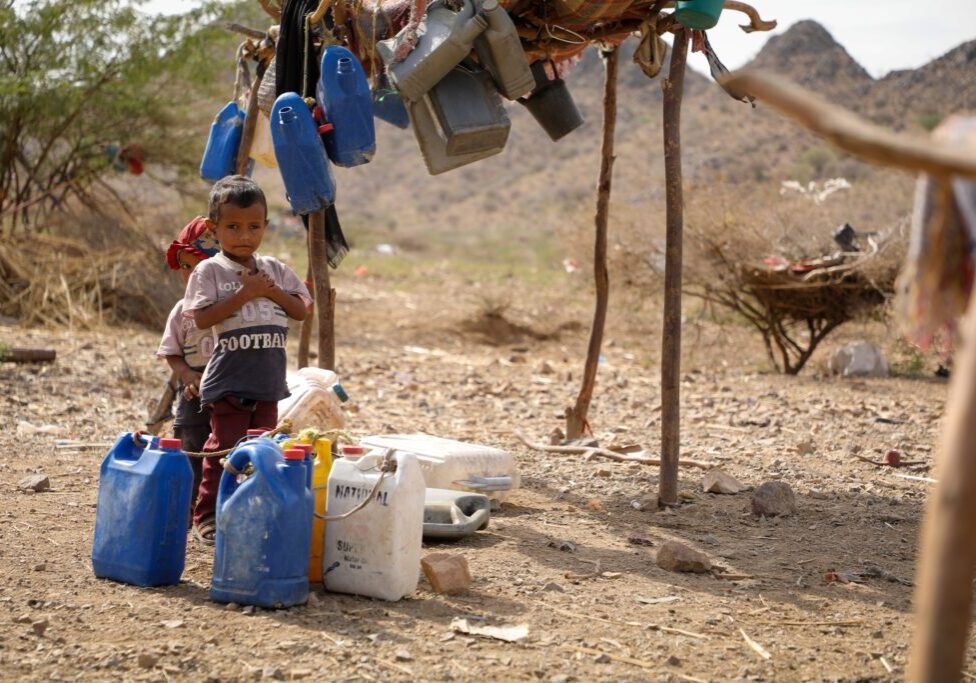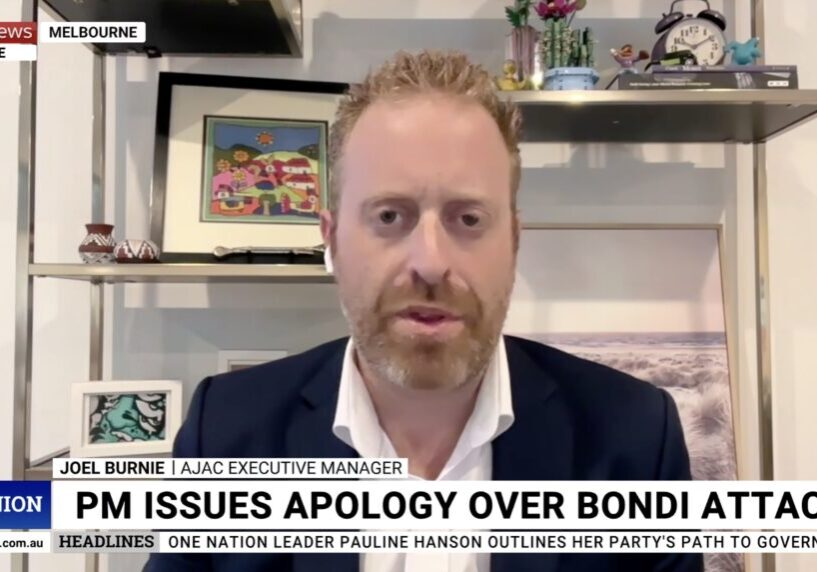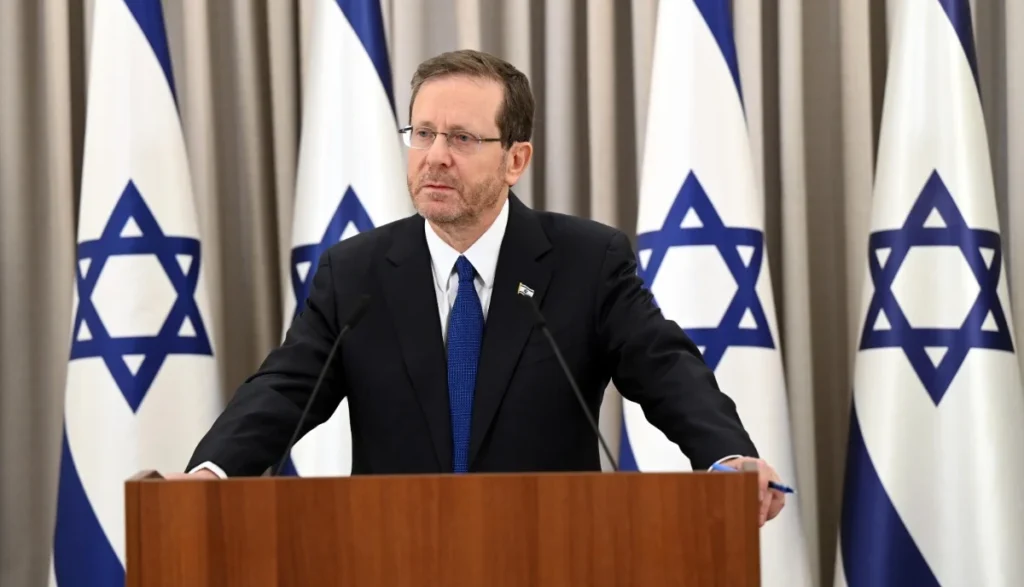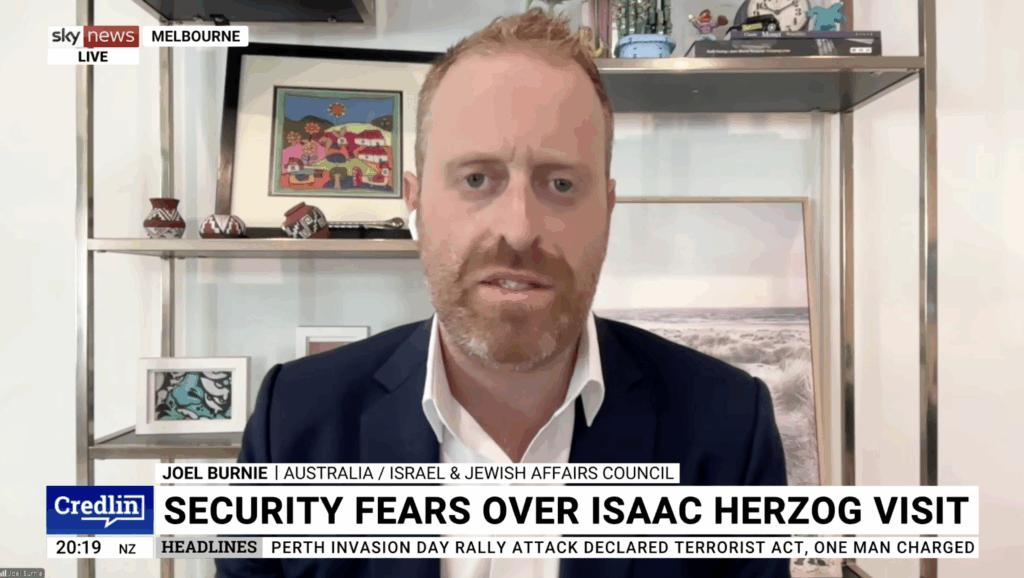FRESH AIR
The misguided campaign against visiting Middle East expert Daniel Pipes
March 23, 2018 | Colin Rubenstein
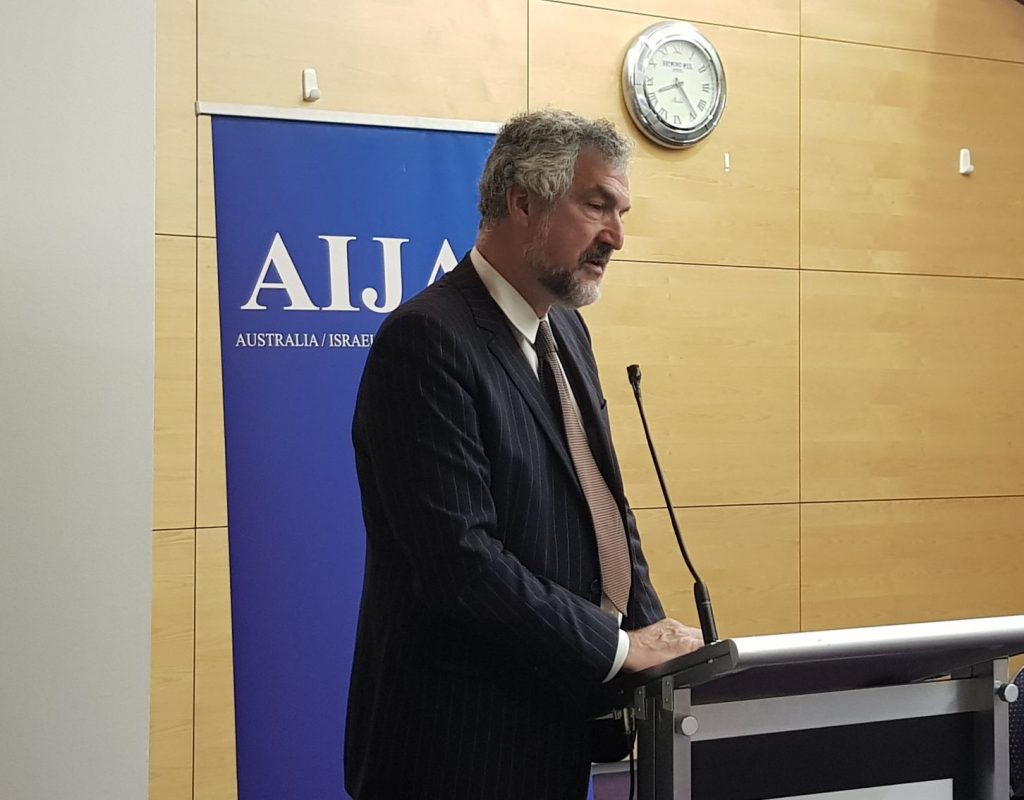
An edited version of this response appears on the ABC’s Religion & Ethics website.
Aboriginal leader Nyunggai Warren Mundine recently wrote about the techniques advocated by far-left author and activist Saul Alinsky in the 1960s, which have since been adopted by many others, arguing they were hampering sensible discussion about efforts to fix the dysfunction in some indigenous communities in Australia. Mundine wrote:
“[Alinsky’s] main technique is constant, personal and negative abuse…. Abusing people as ‘racist’ for opinions that aren’t actually racist is straight from Alinsky’s playbook…. It’s punishing people for not abiding socialist-left dogma that promotes the welfare state as a legitimate way of life and hides the deep, social dysfunction caused by chronic welfare dependency.”
Mundine’s insights came to mind when reading Chloe Patton’s critique, “Daniel Pipes Comes to Melbourne: Are Australian Muslims Right to be Outraged?“, of the recent visit by American scholar of the Middle East, Dr. Daniel Pipes.
Mundine’s point was that false claims of racism were inhibiting serious efforts to address severe problems among large sections of Australia’s indigenous population.
The same can be said about obfuscating claims like Patton’s against Pipes, which by falsely alluding to the racist tag, wilfully damages the need to address a serious and even deadly international problem by dismissing “the issues at the centre of Pipes’ works” as not “worthy of discussion.” That issue is Islamism – a radical ideology which, as anyone who watches the news knows, has been the inspiration in recent decades for extensive acts of international terrorism, other violence, human rights abuse and upheaval in recent decades, and which shows no signs of fading away any time soon.
Moreover, as someone who travelled with Pipes during his recent visit to Australia, and heard all that he had to say at his various public and media appearances and private briefings, I defy anyone to listen to what he actually said – as opposed to what was said about him – and, whether you agree with him or not, assert he did not add to and enrich debate about Middle East policy issues in Australia. (Here are links to his media appearances on Sky-TV’s “The Outsiders”, ABC-TV 24’s “Matter of Fact”, and Sky-TV’s Peta Credlin Show.)
Islamism and Islamophobia
The first thing to understand about Patton’s doing-an-Alinsky on Pipes is that her screed is not really about Pipes per se. It is about the claim, which she mentions several times, that there is an “Islamophobia Industry” of which Pipes is supposedly a leading figure.
This is not only a false claim, but ironically, is advanced in part precisely because That’s a decidedly odd claim in view of the fact that Pipes is, in the words of a Washington Post news story in 2010, “perhaps the most prominent US scholar on radical Islam.”
m.”
Radical Islam, more often known as Islamism, is a serious political danger, as widely acknowledged across the political spectrum. It includes such organisations as the Islamic State, and Al-Qaeda and, Jemaah Islamiyah, violent actors driven by an imperative to transform political, social, cultural and economic life in line with their own extreme interpretation of the tenets of the Islamic religion.
As British scholar and activist Maajid Nawaz, himself a Muslim and former Islamist, has written: “Islam is a faith. Like all other faiths it has a vibrant array of progressives, conservatives and everything in between fighting over which interpretation suits current times…Islamism, on the other hand, is the desire to impose any one of these interpretations over everyone else through state law. Hence, Islam is the religion and Islamism the ideological project using this religion to justify total state power.”
Islamism has become a widely accepted term, used by Australian political leaders from both major parties, other political leaders around the world, as well as routinely employed in media and scholarly discourse.
The only sensible approach to the problem of Islamism, is, in my view, and, frankly, the view of a majority of serious analysts, the one that Pipes articulated in 2005 – and I have heard him say similar things many times since including on his recent Australian visit : “It’s a mistake to blame Islam, a religion 14 centuries old, for the evil that should be ascribed to militant Islam, a totalitarian ideology less than a century old. Militant Islam is the problem, but moderate Islam is the solution.”
Who can disagree with this approach, separating the modern ideology of Islamism from the ancient, widely followed faith of Islam?
Well, Islamists do. For them, it is both a matter of belief and an asset to their cause if Islamism is conflated with the Islamic religion.
Firstly, it assists them to recruit Muslims into Islamist groups – because if Islamism is the same as Islam, then any Muslim who does not adhere to Islamism is ipso facto a bad Muslim. Secondly, a fundamental tenet of Islamism is that virtually all non-Muslims are constantly out to harm Muslims and defeat Islam. If Islamists can create the belief that Islam and Islamism are the same thing, then they actually cause this reality to materialise through their own violent and non-violent attacks on non-Muslims and non-Muslim governments and institutions, thus leaving Muslims with no alternative than to join the Islamists in defending themselves. Finally, this claim is a tremendous tool for warding off criticism and legal measures against extremist behaviour or Islamist violence. If Islamism equals Islam, then any criticism or measure is an attack on Islam as such – and is ipso facto discriminatory and racist, and not to be tolerated.
Thus, if you look back, much of the attempt to paint Pipes as an “Islamophobe” or part of an “Islamophobia industry” originated from the group CAIR, the Council on American-Islamic Relations, after Pipes wrote an article in 1999 in the Los Angeles Times in which he carefully made a distinction between the mainstream Muslim majority in the US and what he called Muslim chauvinists (what he would today call Islamists), who, he said, “aspire to make the United States a Muslim country, perhaps along the Iranian or Sudanese models. Believing that Islamic civilization is superior to anything American, they promote Islam as the solution to all of the country’s ills.” Over the next two months, CAIR published 15 bulletins attacking Pipes, combing through his writings in their efforts to condemn and marginalise him. These attacks quickly spread to other Muslim groups and beyond.
Yet CAIR has had links with the Palestinian terror group Hamas, has been ideologically linked with the Muslim Brotherhood movement, and was originally founded by several leaders of the Islamic Association for Palestine (IAP), an organisation described by the US government as part of “Hamas’ propaganda apparatus.” Several figures associated with the group have either been tried or deported for terrorist activity, though not as part of their work at CAIR. This has not only been documented by researchers, it has been affirmed by a US Federal Judge in 2009, by the FBI, which cut ties with the group the same year, and even by the office of the Canadian Prime Minister. Controversially, the UAE has even banned the group as a terrorist entity.
Interestingly, CAIR insists – in line with the Islamist view that they are the true Muslims – that non-Muslim use the term Islamist to mean “Muslims we don’t like” and also complains that the term is used in an “almost exclusively pejorative context.”
So it is hardly surprising that CAIR, with its Islamist affiliations, would want to tarnish Pipes’ continual attempt to clearly distinguish between Islam as a religion from Islamism as an ideology, while expressing concerns about the latter as inimical to liberal democracy and often violent. Too many, sadly, have latched on to its campaign ever since.
“Critical Race Theory” and the “Islamophobia Industry”
The other claims to pay attention to in understanding the origins of Patton’s piece are in her final two paragraphs, where she says “Pipes and fellow anti-Muslim activists maintain respectability in public debate by eschewing overt racism” and:
“The problem with Pipes’ work lies in its reduction of complex social issues to problems of culture. If the reinforcement of an ideology of European superiority through appeals to culture as opposed to ‘race’ can rightly be considered racism, as critical race theorists argue, then far more of what passes as ‘expert commentary’ on Islam and the Middle East today can, in fact, be considered racist.”
This essentially means that, firstly, Pipes is a racist even if he does not say anything racist – allegedly he is covering up his agenda to maintain respectability.
Secondly, Patton believes that the problem is not just Pipes, but that it’s almost everyone who talks about these issues. She says that “far more of what passes as ‘expert commentary’ on Islam and the Middle East today can, in fact, be considered racist” because it amounts to “the reinforcement of an ideology of European superiority through appeals to culture” – according to the tenets of critical race theory (CRT).
To understand what “critical race theory” is, one needs to know that one of its fundamental tenets is that, no matter what you apply it to, you will find racism. As two pioneers of Critical Race Theory, Beverly Moran & William Whitford, wrote in 1996, “One main thrust of critical race theory is a belief that racial subordination is everywhere, a structural aspect of all parts of American society.”
Traditional standards of evidence are not necessary to make such pronouncements. As Judge Richard Posner, one of the leading public intellectuals in the US, and a critic of critical race theory, has noted:
“What is most arresting about critical race theory is that…it turns its back on the Western tradition of rational inquiry, forswearing analysis for narrative. Rather than marshal logical arguments and empirical data, critical race theorists tell stories – fictional, science-fictional, quasi-fictional, autobiographical, anecdotal-designed to expose the pervasive and debilitating racism of America today.”
In other words, to say something is racist according to the tenets of critical race theory is basically a redundancy. Whatever you analyse under CRT is a priori racist. You just have to discover how to expose that inherent racism to your audience.
Thus Pipes, because he has been targeted by CAIR and other Islamist groups, is also a target for Patton with her Critical Race Theory methodology.
In line with critical race theory, Patton has to uncover the racism that she is certain must be out there in Pipes’ work – but she does so by resorting to misrepresentation, taking statements out of context, and offering facile and weak arguments. Even accurate facts and analysis that Patton does not want to acknowledge become evidence of racism in her telling approach.
For instance, Patton denigrates Pipes claims that Islamists constitute 10% to 15% of the Muslim population worldwide as “his own statistic” and “a figure he takes to be correct because ‘it has been widely accepted and repeated.'”
The claim Pipes bases his figures on the mere fact that it has “been widely accepted and repeated” is just indefensibly wrong. Pipes has offered literally dozens of sources – many of them widely cited international polls of Muslims and studies of Muslim voting behaviour – which he uses as the evidentiary basis for this claim. Moreover, contrary to Patton’s implication that this statement is an example of anti-Muslim extremism, it is broadly in line with what other scholars on the subject assert. The most commonly cited alternative to Pipes’s estimates of 10-15% extremists across all Muslim communities is 7%, offered by John L. Esposito and Dalia Mogahed – based on a Gallup poll of Muslim countries in 2006, and using a particularly narrow definition of “extremist.” That is only slightly below Pipes’ bottom estimate of 10%, and Pipes’ statement noting that there are a hundred million or more adherents globally to Islamism or Islamic extremism, which Patton treats as evidence of racism, remains just as true if you use the Esposito and Mogahed figure. It is simple math.
She also seems to think it is racist for Pipes to say Islamist ideology has been shown to be “capable of appealing to Muslims of every size and shape, from Lumpen proletariat to privileged, from illiterates to PhDs, from the well-adjusted to psychopaths, from Yemenis to Canadians.” Again, this is simply a fact – Islamists have managed to recruit followers, activists and fighters, to differing extents, among virtually all Muslim populations and demographics, something that almost every student of Islamist extremism acknowledges.
Patton falsely depicts Pipes as a “vocal figure in the backlash against the building” of an Islamic prayer centre near ground zero in New York. In fact, while Pipes did express an opinion that it shouldn’t happen, this was only in the context of giving his reflections after the controversy had been raging for some time, and he took no part in the campaign to prevent it.
Patton also seems to think it’s racist or deceptive of Pipes to say of a poll that showed a drop in support for suicide bombings that it may be explained in part because while “terrorism stimulates its own antibodies and offers no plausible path to power, working through the system is proving successful in such diverse places as Egypt, the Palestinian Authority, Lebanon, Iraq, and Bangladesh,” arguing this means Pipes is saying “Muslims are turning to democratic methods of achieving domination.”
The first thing to note is that Pipes also unequivocally said the drop in support for suicide bombings was “good news.” Secondly, the above quote did not refer to “Muslims” broadly, as Patton says, but specifically referred to those with the “Islamist goals of imposing the Shari’a and creating a caliphate.” And thirdly, the above argument was specifically made in response to a claim in the original poll report that improving standards of living were responsible for the declining support for suicide bombings, with Pipes offering a couple of alternative explanations. It is hard to discern what exactly is racist in this perfectly reasonable analytical argument.
In addition, Pipes’ term on the US Institute of Peace did not end due to any acrimony caused by an accusation by Pipes against the Center for the Study of Islam and Democracy, as Patton implies. It ended with the end of a term of Congressional term, as was always intended and required under US law.
Pipes did express concerns that President Obama had not told the truth about being raised a Muslim, and adduced evidence based on various eyewitness accounts of Obama’s childhood that at the time, he “was an irregularly practicing Muslim who rarely or occasionally prayed with his step-father in a mosque.” Pipes was very clear that, at the time of his political career, Obama was and is unequivocally a Christian, contrary to any conspiracy theories. Pipes absolutely never accused Obama of taqiyya (lying to non-Muslims to protect Muslims), as Patton alleges. His concern was that lying about his upbringing showed Obama’s moral failings, and that it might affect US foreign relations if the US President was seen by some Muslims as an apostate from Islam. Again, Patton does not bother disputing Pipes’ evidence on Obama’s childhood, merely assuming what he says on the subject must be false, and then attributes responsibility to Pipes for conspiracy theories spread by others based on a proposition Pipes explicitly rejected, namely that Obama is currently not a Christian but a Muslim.
Patton accuses Pipes of originating the claim that Muslim-controlled no-go zones exist in the West, ignoring the evolution of his thinking and his modifying and clarifying his claim to speak of “partial no-go zones” where ordinary people can enter the areas but not representatives of the government. She curiously adds that German Chancellor Angela Merkel has “bought into” this, referring to Merkel’s statement in February when she said, “There are such areas and one has to call them by their name and do something about them.” Rather than praise Pipes for discerning a problem in Germany that a mainstream political leader with deep knowledge of her own country concluded years later, Patton inexplicably sees this as discrediting Pipes.
Patton concludes with an attack on the Campus Watch project, which Pipes founded. As stated on its website, Campus Watch “mainly addresses five problems: analytical failures, the mixing of politics with scholarship, intolerance of alternative views, apologetics, and the abuse of power over students. Campus Watch fully respects the freedom of speech of those it debates while insisting on its own freedom to comment on their words and deeds.” As an academic, Patton should find these aims laudable, unless she believes that academics should enforce their own political views on their students or abuse their power.
Patton argues that Pipes’ alleged racism is proven by a claim that appeared on the “Campus Watch” site, since removed, that “Middle East studies in the United States has become the preserve of Middle Eastern Arabs, who have brought their views with them.” Pipes has responded that the site never intentionally removes anything on the basis that it is offensive (in accordance with the strong belief in the right to freedom of speech), to the extent that there are many pages on it attacking Campus Watch, itself, and Pipes personally. Each page carries a disclaimer that the views expressed do not necessarily reflect the views of Campus Watch.
Moreover the phrase alleged by Patton to have been deleted to allow Pipes to maintain respectability by eschewing overt racism actually today appears on the site at least 11 times.
Patton admits that Pipes doesn’t claim shadowy Muslim conspiracies, saying that, for him, “it always comes back to Muslims’ supposed numerical superiority.”
This is wrong as a global proposition – Pipes has not made any such claim despite some rhetorical flourishes about overall birthrates in the 1990 article she cites. Since then, Pipes has argued that, in Europe specifically, Muslim populations are growing through immigration and higher birth rates compared to established non-Muslim populations. While there can be debate about whether this matters, the claim is based on inarguable demographic facts – see this Pew study for instance – that Muslims are increasing as a percentage of the European population. Claims Evidence that Patton raises about birthrates in Algeria and other Arab countries are irrelevant to Pipes’ core assertions, which deal with Europe.
By contrast, for the US, Pipes has often criticised those, including Islamic organisations, that inflate the number of Muslims living there, and praised those who produce more realistic figures. This hardly seems the act of someone devoted to harping on any sort of “Muslim demographic threat.”
Finally, Patton moves beyond the absurd and tendentious to the offensive when she compares Pipes’ views to antisemitic conspiracy theories generally and the Protocols of the Elders of Zion specifically. Patton is not only slandering Pipes, but also effectively downplaying antisemitism. Antisemitic propaganda classically claims a successful conspiracy by all or many Jews to take over the world, or some aspect of it, and has no basis in truth. Pipes does not claim this of Muslims on the whole and is very careful to make this clear. He does note that Muslim populations are increasing across the West, and merely cites well-known examples of Islamists calling for the taking over or defeat of the West, or for establishing an Islamic Caliphate.
Again, he is speaking of an ideology – Islamism – and the self-described goals of its principal advocates, to Islamise the whole world and remake all governments and societies based on Islamic Sharia law. So according to Patton’s logic, if for examples, someone were to say that saying during the Cold War that Marxist-Leninists wanted to communise the whole world through global revolution – which was true as it was indeed their declared goal – this would also have been the equivalent of the “Protocols of the Elders of Zion.”
Patton and other critics, in citing examples of Pipes expressing concern about Islamism and falsely presenting it as criticism of all Muslims – also ignore the positive views Pipes has expressed about the potentiality of Muslim immigrants in Western countries. In the 1999 Los Angeles Times article which sparked the CAIR campaign against him, Pipes said that if Muslim migrants came to the US with an “integrationist approach” then “the Muslim community should fit well into the fabric of American life. There is also the added benefit that the well-educated, affluent and ambitious community of American Muslims will spread their version of a modern and tolerant Islam to the Middle East, South Asia and elsewhere.” In the very controversial 1990 piece in which he mistakenly referred to “brown-skinned peoples cooking strange foods” without using quote marks, thus failing to make it clear he was referring to local attitudes in Europe, not his own, Pipes wrote that, if properly handled, Muslim immigration to Europe could “bring much of value, including new energy, to their host societies.”
What does Daniel Pipes bring to foreign policy debate in Australia?
Daniel Pipes is of course a Harvard-educated, Arabic-speaking scholar of the Middle East. He has taught at some of the top US Universities – Harvard, the University of Chicago, the U.S. Naval War College.
While he has for some time now moved to the thinktank world, he still has a hand in academia – serving in formal roles as a visiting scholar at Pepperdine, in 2008, and Stanford University, up until 2012, in recent years (contrary to Patton’s incorrect claim in her article.)
He has published 16 books, and has had articles published in more than 100 newspapers worldwide including Los Angeles Times, New York Times, Wall Street Journal, Washington Post, the Australian, Australian Financial Review and Sydney Morning Herald and major magazines including Atlantic Monthly, Commentary, The Economist, Foreign Affairs, Harper’s, New Republic, Newsweek and Time.
He has appeared on almost every major current affairs program in the US, as well as the BBC, ABC, Sky-TV and Al-Jazeera, and has lectured in more than 25 countries worldwide.
He has been to Australia thirteen times since 1984.
Incidentally, while Patton may think he should be unwelcome in Australia, it bears noting that he is welcome in Arab and Muslim majority countries. In the past two years alone, he has visited Jordan, the UAE, Oman, Malaysia and Brunei. (Pipes published some public praise for some of these nations he has visited, including Dubai and Oman.) During these trips, he met a former prime minister and members of parliament in Jordan, a former advisor to the prime minister in Malaysia, and the Sultan of Brunei. Apparently these political leaders consider him someone worth listening to, unlike Patton.
Pipes also has a very good record, as an analyst, of making successful predictions.
For example:
- In 1980, he predicted the Iranians would free their US diplomatic hostages before new President Ronald Reagan took office.
- During the 1982 Lebanon war, he correctly predicted it would be “last major Arab-Israeli military confrontation for a long time to come, maybe ever.”
- In 1985, he warned that Islamist fundamentalist forces in Afghanistan fighting the Soviets were likely to become a problem for the US in the future.
- In 1989, he predicted that a clash between the Syrian regime, controlled by the Alawi minority, and the Sunni majority in the country was inevitable sooner or latter.
- In 1990 and 1991, he predicted that any American attempt to occupy Iraq and impose a new government on it would almost certainly end in disaster.
- In 1994 he noted that the danger to Israel in the future would not be from “soldiers, tanks, and aircraft” but “missiles and unconventional weaponry”.
- Also in 1994, he predicted that if Saddam Hussein were removed as dictator of Iraq, Iran would likely attempt to take control of the country as a “classic satrapy rather than move to an outright annexation.”
- In 1999, he predicted an Israeli retreat from southern Lebanon would lead to future war with Hezbollah.
- In May 2000, he predicted that Syrian troops would withdraw from Lebanon “in five years.” They withdrew in April 2005.
- In August 2000, he effectively predicted the Camp David peace talks would likely lead to the Palestinian intifada, which erupted in late September.
- In 2001, he correctly predicted the Palestinian territories might be split into two parts, the West Bank and Gaza, following the death of Yasser Arafat.
- In 2005, he predicted that in any future “real” elections in Egypt “Islamists will probably prevail there.”
- In 2011, he predicted that Libya without Qaddafi would turn into “another Somalia.”
Most famously, he is one of the few scholars who came close to predicting the Sept. 11, 2001 terror attacks, writing four months before the attack in the Wall Street Journal that al Qaeda was “planning new attacks on the US” and its operatives were learning, “for example, how to destroy large buildings.”
Perhaps that is why, during his recent visit, there was extraordinary interest in hearing Pipes’ views among leading Australian journalists, politicians, and government officials, all of whom clearly view him as an expert worth hearing.
What they heard from him, among other things, was about the increasing despotism in Turkey under the Erdogan government, as well as its reckless, aggressive foreign policy; about his very positive hopes for the far-reaching reform efforts of Saudi Arabia’s new effective ruler Crown Prince Mohammed Bin Salman, including the reform of Wahhabism into a more moderate form of Islam; about his belief that the Iranian regime is looking increasingly hollow and unpopular and its demise is merely a matter of time, but in the meantime its domination of four Arab capitals makes it the most urgent, immediate challenge in the Middle East; and about his pessimism that Israeli-Palestinian peace is achievable in the short term, scepticism towards US President Trump’s approach to Israeli-Palestinian issues, and his belief that peace requires achieving a change in Palestinian culture so that there is genuine acceptance of the permanency of Israel alongside any possible future Palestinian entity. And, interestingly for someone who is supposedly infamous for talking up a claimed but non-existent Islamist threat, according to Patton, he also argued that the Islamist problem has probably peaked and will now gradually decline.
The current predicament of Muslim communities
I can certainly appreciate why Muslim communities in Australia and elsewhere are currently especially apprehensive about anti-Muslim bigotry and Islamophobia at the moment.
Globally, in recent years, we have seen a massive surge in support for populist anti-immigration and often openly anti-Muslim parties.
In Australia, we have seen the growth and normalisation of One Nation, and the rise of smaller similar groups like the Australian Liberty Alliance and the United Patriots Front.
We have seen the rise of the “alt-Right” in the US and a crude wish to ban Muslim immigration from US President Trump.
And Europe has seen perhaps the most frightening rise of groups like the National Front in France, the Alternative for Germany, the Sweden Democrats, the Danish People’s Party, and the Golden Dawn in Greece. Not only have nationalist governments come to power in Eastern European countries like Hungary and Poland, but recent elections saw the rise of a coalition consisting of the anti-immigration Austrian Freedom Party (FPÖ) together with the conservative People’s Party – which has itself adopted some of the rhetoric and policies of the FPÖ. Meanwhile, the Italian election last month saw more than half the vote going to various parties once considered fringe, most with anti-immigration policies.
Ironically, in the very comments about “Eurabia” that are central to Patton’s critique, Pipes also predicted this development, repeatedly noting that bad immigration policies would lead to the rise of such parties – see here, here and here. (In contrast, he has praised Australian immigration policies as the most intelligent in the West.) While Pipes advocates a change in European immigration policies, and has suggested that the anti-immigration parties will inevitably have a role to play in such a change, he has harshly criticized them, saying “they contain dismaying proportions of power-hungry eccentrics, conspiracy theorists, historical revisionists, and anti-Jewish or anti-Muslim extremists.”
Pipes has also publicly criticised US President Trump’s ugly rhetoric about a “ban” on Muslim immigration.
I would urge leaders of Muslim communities in Australia – as well as scholars concerned about their well-being and integration – not to listen to those who insist that any criticism of the Islamist ideological project is an attack on Islam itself, nor to shoot the messenger when an analyst presents findings that challenge them. This helps neither those communities, nor the broader Australian multiculturalism which is the key to allowing all elements of Australian society to thrive within the framework of shared core national values – accepting one’s responsibilities as well as the rights provided by our largely successful multicultural society.
AIJAC does not necessarily agree with or endorse everything Pipes says or advocates, but, as indicated by the interest he continues to generates among policymakers and commentators, Daniel Pipes has been a valuable participant in both Australian and global debates about policy toward the Middle East and Islamism for many decades, including on during his most recent visit to this country. We invite both Muslim and other Australians to listen to what he actually had to say in Australia, rather than what critics said about him, and if you take issue with any of it, to address those statements directly. Only extremists – Islamist, far right and far left – benefit from efforts to blacklist as beyond the pale and pre-emptively silence a well-known, widely-quoted academically-trained expert, and one with an impressive analytical track record.
Dr. Colin Rubenstein
RELATED ARTICLES
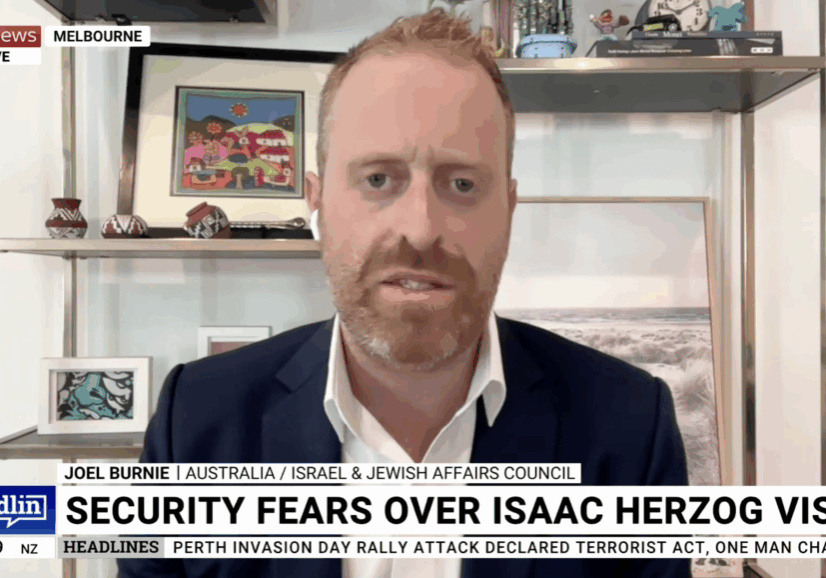
Security concerns over Herzog visit a terrible indictment: Joel Burnie on Sky News
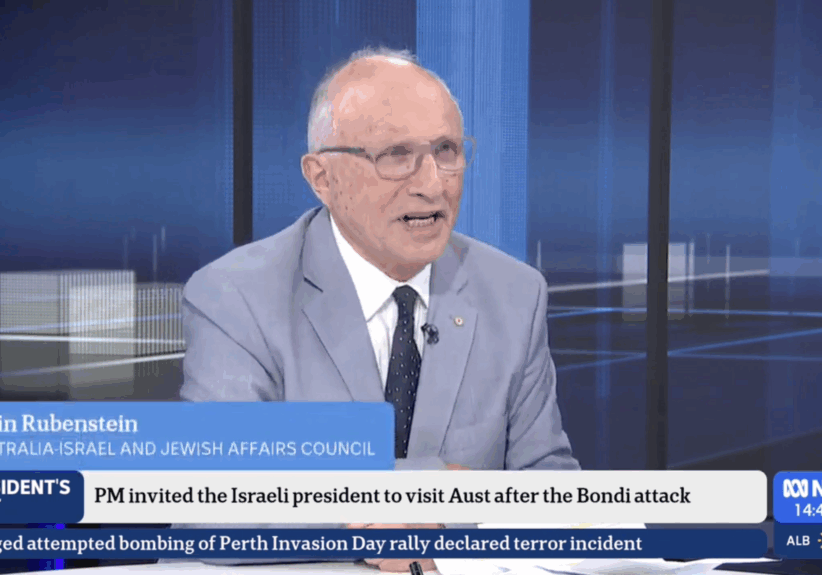
Allegations against Israeli President Herzog are absurd: Colin Rubenstein on ABC News







